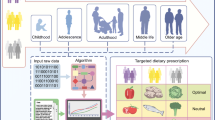Abstract
In this article, we critically address the contribution of dietary advice to the overall strategy of prevention and treatment of the metabolic syndrome. In particular, we underline how an appropriate choice of food items and nutrients should anticipate or accompany pharmacological therapy (often greatly limiting the use of drugs).
Similar content being viewed by others
References
Gade W, Schmit J, Collins M, Gade J (2010) Beyond obesity: the diagnosis and pathophysiology of metabolic syndrome. Clin Lab Sci 23:51–61
Esposito K, Marfella R, Ciotola M, Di Palo C, Giugliano F, Giugliano G et al (2004) Effect of a mediterranean-style diet on endothelial dysfunction and markers of vascular inflammation in the metabolic syndrome: a randomized trial. JAMA 292:1440–1446
Trichopoulou A, Critselis E (2004) Mediterranean diet and longevity. Eur J Cancer Prev 13:453–456
Meksawan K, Venkatraman JT, Awad AB, Pendergast DR (2004) Effect of dietary fat intake and exercise on inflammatory mediators of the immune system in sedentary men and women. J Am Coll Nutr 23:331–340
Volek JS, Phinney SD, Forsythe CE, Quann EE, Wood RJ, Puglisi MJ et al (2009) Carbohydrate restriction has a more favorable impact on the metabolic syndrome than a low fat diet. Lipids 44:297–309
Kendall CW, Josse AR, Esfahani A, Jenkins DJ (2010) Nuts, metabolic syndrome and diabetes. Br J Nutr 5:1–9
EFSA Panel N on Dietetic Products utrition, Allergies (2010) Scientific opinion on dietary reference values for carbohydrates and dietary fibre. EFSA J 8:1462
Richard D, Bausero P, Schneider C, Visioli F (2009) Polyunsaturated fatty acids and cardiovascular disease. Cell Mol Life Sci 66:3277–3288
Minihane AM (2010) Fatty acid–genotype interactions and cardiovascular risk. Prostaglandins Leukot Essent Fatty Acids 82:259–264
Rosenson RS, Gelb MH (2009) Secretory phospholipase A2: a multifaceted family of proatherogenic enzymes. Curr Cardiol Rep 11:445–451
Richard D, Kefi K, Barbe U, Bausero P, Visioli F (2008) Polyunsaturated fatty acids as antioxidants. Pharmacol Res 57:451–455
Richard D, Wolf C, Barbe U, Kefi K, Bausero P, Visioli F (2009) Docosahexaenoic acid down-regulates endothelial Nox 4 through a sPLA2 signalling pathway. Biochem Biophys Res Commun 389:516–522
Le Guennec JY, Jude S, Besson P, Martel E, Champeroux P (2010) Cardioprotection by omega-3 fatty acids: involvement of PKCs? Prostaglandins Leukot Essent Fatty Acids 82:173–177
Visioli F, Galli C (2002) Biological properties of olive oil phytochemicals. Crit Rev Food Sci Nutr 42:209–221
Bogani P, Galli C, Villa M, Visioli F (2007) Postprandial anti-inflammatory and antioxidant effects of extra virgin olive oil. Atherosclerosis 190:181–186
Covas MI (2007) Olive oil and the cardiovascular system. Pharmacol Res 55:175–186
Visioli F, Hagen TM (2007) Nutritional strategies for healthy cardiovascular aging: focus on micronutrients. Pharmacol Res 55:199–206
Ames BN (2006) Low micronutrient intake may accelerate the degenerative diseases of aging through allocation of scarce micronutrients by triage. Proc Natl Acad Sci USA 103:17589–17594
Gokce N, Keaney JF Jr, Frei B, Holbrook M, Olesiak M, Zachariah BJ et al (1999) Long-term ascorbic acid administration reverses endothelial vasomotor dysfunction in patients with coronary artery disease. Circulation 99:3234–3240
Duffy SJ, Gokce N, Holbrook M, Huang A, Frei B, Keaney JF Jr et al (1999) Treatment of hypertension with ascorbic acid. Lancet 354:2048–2049
The Local Food Nutraceutical Consortium (2005) Understanding local Mediterranean diets: a multidisciplinary pharmacological and ethnobotanical approach. Pharmacol Res 52:353–366
Huang TH, Teoh AW, Lin BL, Lin DS, Roufogalis B (2009) The role of herbal PPAR modulators in the treatment of cardiometabolic syndrome. Pharmacol Res 60:195–206
Richard D, Kefi K, Barbe U, Poli A, Bausero P, Visioli F (2009) Weight and plasma lipid control by decaffeinated green tea. Pharmacol Res 59:351–354
Shay KP, Moreau RF, Smith EJ, Smith AR, Hagen TM (2009) Alpha-lipoic acid as a dietary supplement: molecular mechanisms and therapeutic potential. Biochim Biophys Acta 1790:1149–1160
Albert MA, Glynn RJ, Ridker PM (2003) Alcohol consumption and plasma concentration of C-reactive protein. Circulation 107:443–447
Alkerwi A, Boutsen M, Vaillant M, Barre J, Lair ML, Albert A et al (2009) Alcohol consumption and the prevalence of metabolic syndrome: a meta-analysis of observational studies. Atherosclerosis 204:624–635
Ducimetiere P (2009) Alimentation et risque coronaire. Le paradox française n’a plus lieu d’être. Questions de Santé Publique 6:1–4
Soleas GJ, Diamandis EP, Goldberg DM (1997) Resveratrol: a molecule whose time has come? And gone? Clin Biochem 30:91–113
Conflict of interest
None.
Author information
Authors and Affiliations
Corresponding author
About this article
Cite this article
Visioli, F., Poli, A. & Paoletti, R. Nutritional intervention helps pharmacology in the management of the metabolic syndrome. Mediterr J Nutr Metab 3, 203–207 (2010). https://doi.org/10.1007/s12349-010-0024-9
Received:
Accepted:
Published:
Issue Date:
DOI: https://doi.org/10.1007/s12349-010-0024-9




